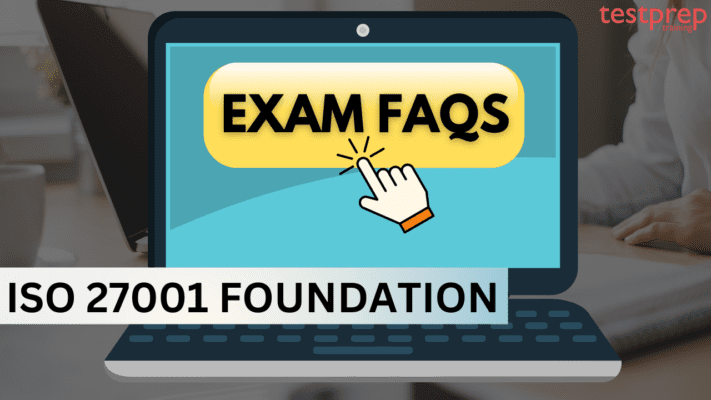ISO 27001 Foundation
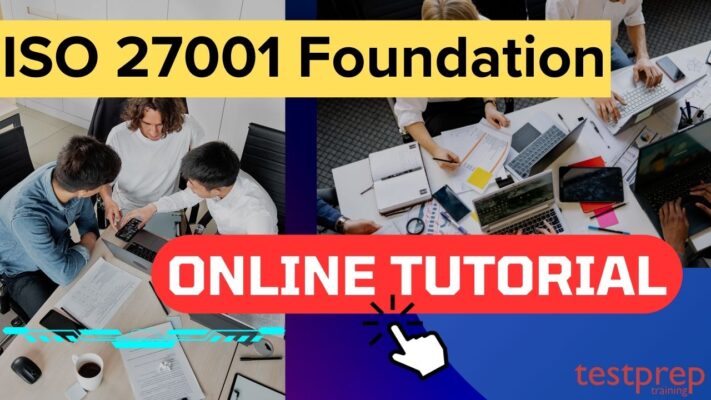
ISO 27001 sets down the rules for creating, maintaining, implementing, and always enhancing an information security management system (ISMS). This certification is made to assist participants in understanding the basics of information security and the need for an information security management system according to ISO 27001:2022. Moreover, the “ISO 27001 Foundation” certificate intends to prove that individuals who earn it are familiar with the ISO/IEC 27001 requirements for managing and implementing an ISMS.
Target Audience:
- Managers and consultants looking to learn more about information security.
- Professionals who want to understand the ISO/IEC 27001:2022 requirements for an ISMS.
- Individuals involved in or in charge of information security activities in their organization.
- Those aspiring to build a career in information security.
What you will learn?
After finishing this certification program, participants will have the skills to:
- Explain the key concepts, principles, and definitions of information security management.
- Clarify the primary ISO/IEC 27001 requirements for an information security management system (ISMS).
- Recognize the approaches, methods, and techniques employed for implementing and managing an ISMS.
Exam Details
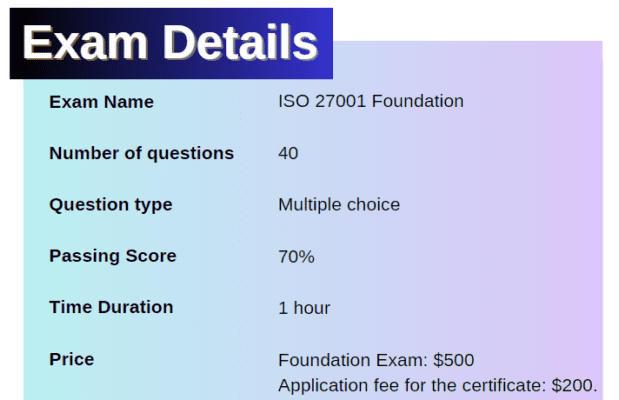
The ISO 27001 Foundation exam has 40 questions, all of which are multiple-choice. These questions assess candidates’ comprehension of both simple and complex concepts. Each multiple-choice question has three options: one correct response (keyed response) and two incorrect response options (distractors). The time duration for the exam is one hour. You need to score a minimum of 70% to pass the exam. The costs for this certificate program are:
- Foundation Exam: $500
- Application fee for the certificate: $200.
Course Outline
The exam covers the following domains:
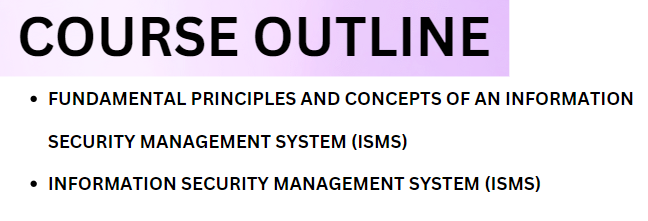
Domain 1: Understand the basic principles and concepts of an information security management system (ISMS)
Main objective: Ensuring that the candidate has the skills to interpret the main ISO/IEC 27001 principles and concepts based on ISO/IEC 27001.
Competencies:
- Ability to:
- Explain the relation between ISO/IEC 27001 and other ISO standards, such as ISO/IEC 27002 and ISO/IEC 27003
- Distinguish between other ISO management system standards
- Interpret the definition of a management system
- Explain the structure of ISO/IEC 27001
- Identify the main requirements of ISO/IEC 27001 for an ISMS
- Explain the main concepts of information security
- Explain the relationship between information and assets
- Interpret the concept of confidentiality, integrity, and availability of information
- Explain the definition of threat, vulnerability, and information security risk
- Interpret the relationship between information security concepts, such as vulnerability, threat, risk, and impact
- Describe the main characteristics of artificial intelligence and cloud computing
Knowledge statements:
- Knowledge of:
- Main standards of the ISO/IEC 27000 family
- Other information security regulations, industry standards, and best practices
- Advantages of implementing an ISMS based on ISO/IEC 27001
- Definition of management system and management system standards
- Structure of ISO/IEC 27001
- Main requirements of ISO/IEC 27001, clauses 4 to 10
- “Plan-Do-Check-Act” (PDCA) cycle
- Main concepts of information security related to ISO/IEC 27001
- Relationship between information security elements
- Concept of information confidentiality, integrity, and availability
- Information security vulnerabilities, threats, and risks
- Main characteristics of artificial intelligence and cloud computing
Domain 2: Understand the Information security management system (ISMS)
Main objective: Ensuring that the candidate has the skills to identify and interpret the requirements of ISO/IEC 27001 for an ISMS.
Competencies:
- Ability to:
- Analyze how ISMS objectives are set
- Analyze the internal and external context of an organization
- Identify the key roles and responsibilities of interested parties regarding the ISMS
- Explain the requirements of ISO/IEC 27001 regarding leadership and commitment of the top management
- Identify different types of policies
- Interpret the development life cycle of an information security policy
- Explain the different activities of the risk management process
- Identify the criteria that should be considered when selecting a risk assessment methodology
- Explain how risks are identified, analyzed, and evaluated
- Interpret the requirements of ISO/IEC 27001 regarding information security risk treatment and regarding competence and awareness
- Identify the resources required for the ISMS implementation
- Interpret the concepts of training, awareness, and communication
- Explain the requirements of ISO/IEC 27001 regarding documented information
- Identify the main processes necessary for the operation of an ISMS
- Interpret the requirements of ISO/IEC 27001 regarding performance evaluation
- Distinguish between different types of audits
- Explain the concept of non-conformity and the corrective action process
- Interpret the requirements of ISO/IEC 27001 regarding management review and regarding continual improvement
Knowledge statements:
- Knowledge of
- Typical ISMS objectives
- What typically constitutes an organization’s internal and external context
- Roles and responsibilities of interested parties relevant to ISMS
- Role of the top management in regards to the ISMS implementation
- Different policies, such as highlevel general, high-level specific, and topicspecific
- Information security policy and its development life cycle
- Processes required to manage information security risks
- Selection of the risk assessment methodology
- Risk identification, analysis, and evaluation
- Risk treatment options
- Main competence and awareness activities
- Resource management during the ISMS implementation process
- Training and awareness activities and communication principles
- Types of documented information relevant to the ISMS
- Operational planning requirements of ISO/IEC 27001
- Concepts of monitoring, measurement, analysis, and performance evaluation and their differences
- Internal and external audits
- Nonconformities, action plans, and corrective actions
- Management review activities
- Definition and benefits of continual improvement
- Type and function of security controls
- Annex A controls of ISO/IEC 27001
ISO 27001 Foundation Exam FAQs
Exam Policies
PECB has specific policies regarding its exams, including the following:
Exam Taking Rules:
Candidates must be present at least 30 minutes before the exam commences. Late arrivals will not receive extra time and may be denied entry to the exam. Candidates must bring a valid ID card (national ID, driver’s license, or passport) and show it to the invigilator. The exam lasts for one hour. For Foundation exams taken in a non-native language (paper-based), an additional 10 minutes can be granted upon request on the exam day.
PECB Exam Format and Types:
PECB offers two types of exam formats:
- Paper-based: Exams are provided on paper; candidates can only use the exam paper and a pen. Electronic devices like laptops, tablets, or phones are not allowed. The exam is supervised by a PECB-approved Invigilator at the training course location organized by the Partner.
- Online: Exams are electronically delivered through the PECB Exams application. The use of electronic devices, such as tablets and cell phones, is prohibited. The exam session is remotely supervised by a PECB Invigilator via the PECB Exams application and an external/integrated camera.
Exam Results:
Candidates will receive their exam results through email. The timeframe for result communication varies; it takes three to eight weeks for essay-type exams and two to four weeks for multiple-choice paper-based exams, while online multiple-choice exam results are provided instantly. Successfully passing the exam allows candidates to apply for one of the credentials within the respective certificate program.
Exam Retake Policy:
Candidates have the opportunity to retake the exam multiple times, but there are certain restrictions regarding the time intervals between retakes. If a candidate does not pass the exam on the first attempt, they must wait for 15 days after the initial exam date for the next attempt (1st retake).
ISO 27001 Foundation Exam Study Guide
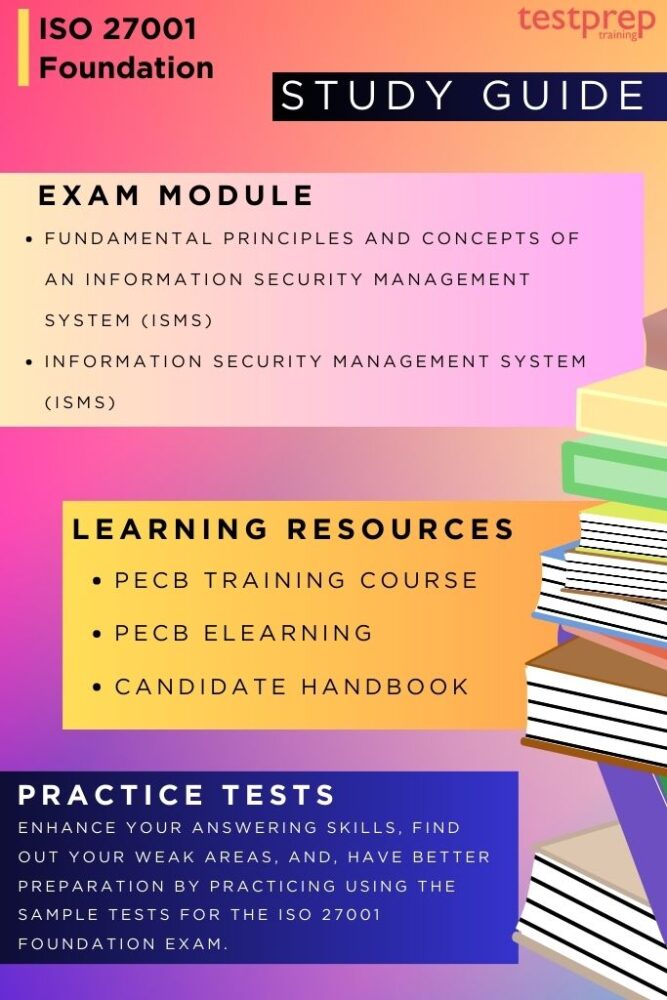
1. Use the PECB Training Course:
ISO/IEC 27001:2022 Foundation training enables you to grasp the fundamental aspects of setting up and overseeing an Information Security Management System, in line with ISO/IEC 27001:2022. Throughout this training, you’ll comprehend various components of ISMS, covering aspects like ISMS policy, procedures, performance metrics, management commitment, internal audit, management review, and continuous improvement.
Upon finishing the course, you can take the exam and seek the “PECB Certificate Holder in ISO/IEC 27001:2022 Foundation” credential. This PECB Foundation Certificate indicates your comprehension of essential methodologies, requirements, frameworks, and management approaches. This covers:
- Lecture sessions include practical questions and examples.
- Practical exercises involve examples and discussions.
- Practice tests mirror the format of the Certificate Exam.
2. PECB Elearning
PECB eLearning training courses are designed to meet individual needs and overcome spatial and temporal constraints. This ensures a top-notch learning experience through engaging and high-quality courses in various fields. As we shape a future without physical barriers, you can be confident in an unparalleled learning journey. Reasons to take PECB eLearning Training Courses:
- With eLearning, you can learn at your own pace, whenever suits you.
- Choose courses based on your needs and preferences.
- Gain access to online resources, training courses, and relevant information.
- Benefit from premium and interactive content delivered by different experts.
- Save on expenses by taking courses from the comfort of your chosen environment.
3. Use the Exam Handbook
Get all the crucial details about the ISO 27001 Foundation exam from the candidate handbook. This guide is your main reference, providing information on the exam’s structure, format, topics, rules, and more. It compiles everything you need to know about taking the exam in one convenient place, making it a valuable resource for your preparation. Make sure to carefully go through the handbook to acquaint yourself with the exam, enhancing your chances of success.
4. Take Practice Tests
Taking practice tests for the ISO 27001 Foundation exam is a smart and effective way to prepare for the real test. These practice exams are similar to the actual exam, helping you get used to the format, types of questions, and time constraints. They enable you to identify your strengths and areas that require improvement, allowing you to concentrate your study efforts where they will be most beneficial. Make the most of this valuable resource to enhance your exam readiness, increase your familiarity with the material, and improve your chances of success in the exam.


